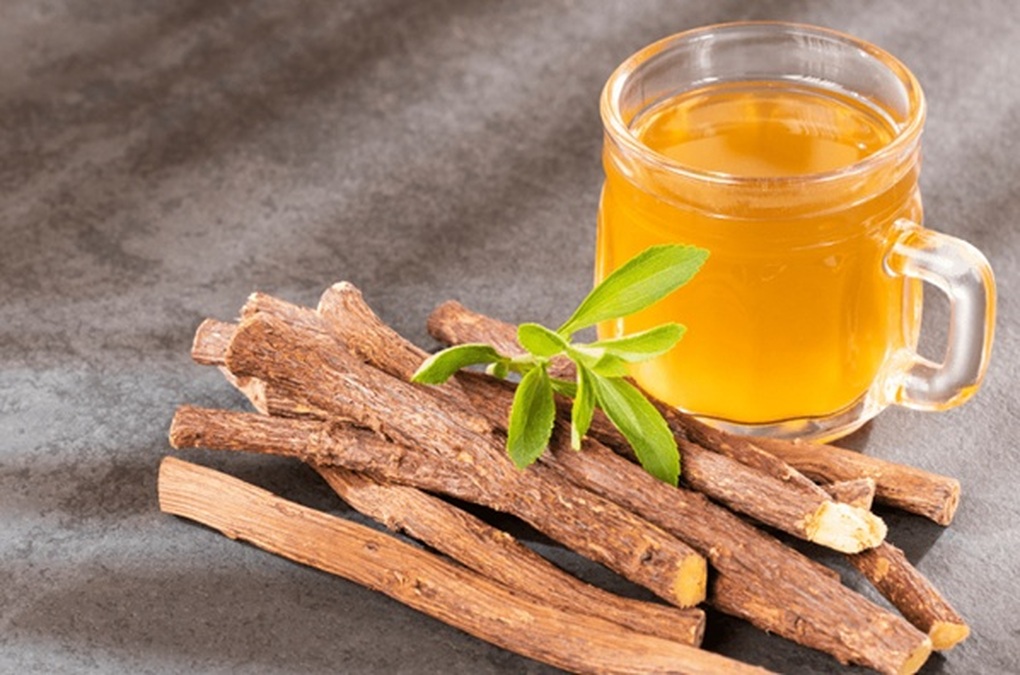What is licorice root?
Licorice is a legume native to Europe and Asia. Glycyrrhiza in the name of the licorice plant means sweet root. Glycyrrhiza extract can be 30-50 times sweeter than sugar.
In Traditional Chinese Medicine, licorice root has anti-inflammatory properties and has been used to treat coughs, colds, gastrointestinal problems, and reproductive problems in women for centuries.
In Oriental medicine, licorice root is also used as a carrier drug. It is used in conjunction with other herbs and remedies to enhance the effects of other drugs, and at the same time, to guide other drugs to the right place for the most effective effect.

Licorice root is a medicinal herb commonly used in traditional medicine (Photo: BV).
Health Benefits of Licorice Root
Heartburn and acid reflux
According to Nguyen Tri Phuong Hospital (HCMC), licorice root extract has been found to be effective in treating indigestion. In addition, it is also a natural remedy for nausea, indigestion and stomach pain.
Adrenal fatigue
Our lives are being affected by environmental, physical and mental stress disorders. This causes many people's adrenal glands to be overactive and leads to adrenal fatigue.
Research shows that licorice helps the body regulate cortisol - the stress hormone - more effectively, thereby helping the adrenal glands rest. Because of this effect, licorice root is considered one of the herbs that help improve stress.
Immune
Licorice is emerging as a potential agent for the treatment and prevention of diseases such as hepatitis C, influenza, etc. Triterpenoids in licorice root have antiviral effects. Therefore, licorice extract becomes a potential ingredient in immune-enhancing treatments.
Cough/sore throat
Licorice root is beneficial for people with sore throats or coughs, as it is considered an effective expectorant, helping to thin and loosen phlegm. The soothing, anti-inflammatory properties of licorice root can provide quick relief from a sore throat.
Menopause and premenstrual syndrome
Licorice root also has estrogen-like effects in women. This herb is an option for menstrual and fertility issues and premenstrual syndrome.
This is also one of the most recommended herbal supplements during menopause.
Pain Relief
Licorice root is effective for painful muscle spasms and cramps as well as colic. Licorice can essentially relieve the discomfort of eczema and other skin conditions because it acts like a hydrocortisone.
Side effects of using licorice root
The side effects of licorice root are mainly related to glycyrrhizin. For healthy adults without contraindications, glycyrrhizin is a beneficial ingredient for their health.
To minimize the risk of complications, you should not abuse licorice root extract and should not use it in large doses for long periods of time without giving your body regular breaks.
You should not use licorice root extract supplements if you are pregnant, as it may increase the risk of premature birth or miscarriage, or if you have heart, liver, or kidney problems.
Some evidence suggests that taking licorice in supplement form may have estrogen-like effects on female hormone-related health problems such as breast cancer, uterine cancer, ovarian cancer, endometriosis, and uterine fibroids. So people with these conditions should not take it.
Licorice root can also increase muscle tone and lower blood potassium, which can lead to erectile dysfunction. Therefore, if you supplement with licorice root extract, the maximum recommended dose is 6-18g per day to limit the amount of glycyrrhizin.
You should stop taking licorice root 2 weeks before surgery, as it may affect blood pressure control during surgery.
Source: https://dantri.com.vn/suc-khoe/nhung-loi-ich-cua-re-cam-thao-su-dung-the-nao-cho-dung-20250607071352703.htm



















































































![[OCOP REVIEW] Tu Duyen Syrup - The essence of herbs from the mountains and forests of Nhu Thanh](https://vphoto.vietnam.vn/thumb/402x226/vietnam/resource/IMAGE/2025/6/5/58ca32fce4ec44039e444fbfae7e75ec)







Comment (0)